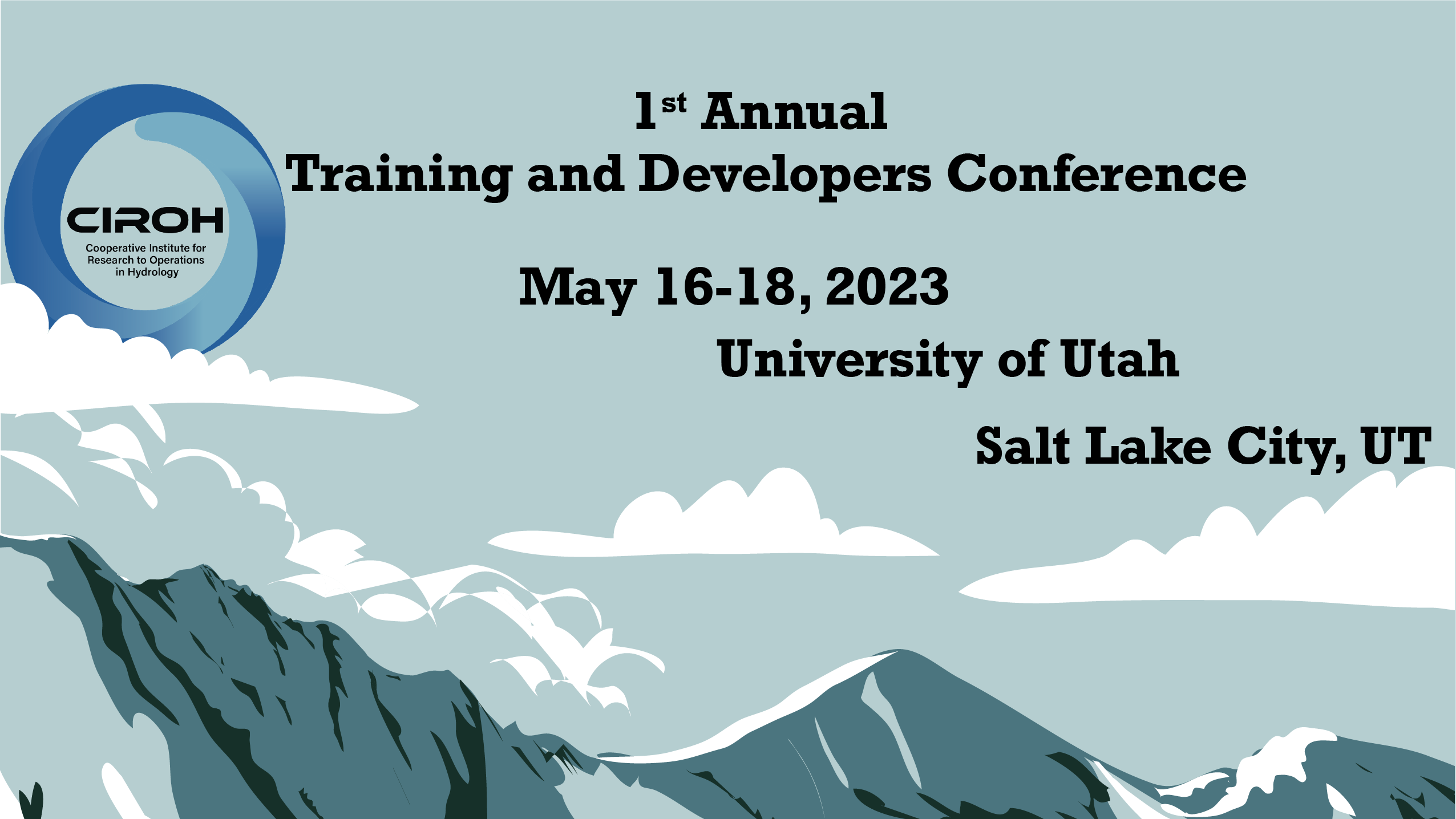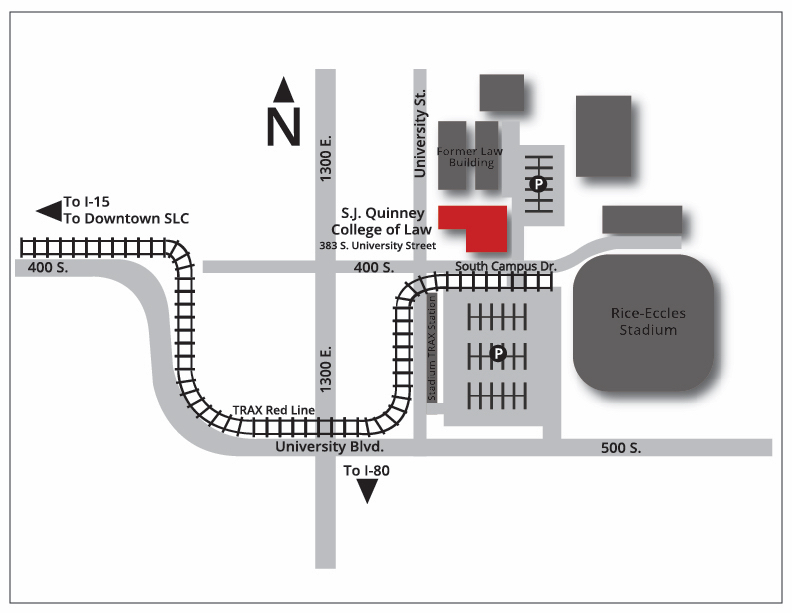
Introduction
CIROH is proud to host the inaugural Training and Developers Conference May 16-18, 2023, at the University of Utah in Salt Lake City. The conference aims to develop a community of practice around CIROH’s research and development activities. The conference will be in-person only.
Who should attend?
The conference is open to the broad scientific and practitioner communities. The conference will focus on a wide range of topics relating to hydrological forecasting, particularly of extreme events – in line with CIROH’s current research and development emphasis. These include hydrological modeling (NextGen), flood inundation mapping, hydroinformatics, social science, and community engagement. The conference will offer participants an opportunity to engage with the CIROH community and its federal partners, learn about recent research and development activities, and get hands-on training on emerging models, tools, and services.
Agenda
The Conference will include a daily mixture of:
- Keynote presentations from CIROH members, federal partners, and local practitioners
- Poster and Lightning Talks Presentations
- Hands-on Training on CIROH-related tools and services
- Networking and Community Building activities – including a pre-conference (May 15) half-day networking program.
Monday Career-Building and Educational Field Activity
CIROH will be holding a transdisciplinary career-building and educational field activity held at Antelope Island State Park with the motivation to connect CIROH researchers and educate them on water resources management and problems in the Western US. The trip will be free of charge for all conference attendees and include the transportation of the participants from Salt Lake City, Utah to Antelope Island State Park, or other nearby locations depending on conditions, to take in the sunset in the eastern boundary of the Great Salt Lake. The activity will be outside and require appropriate clothing and footwear for hiking.
Poster and Lightning Talk Presentations
During the registration, participants may submit an abstract for the Poster and/or Lightning Talks sessions. A Lightning Talk is a 2-minutes and 1-slide presentation to advertise an interesting new idea/results/paper/product. Depending on demand, participants may be allowed to present their abstract both as a poster and a lightning talk.
Keynote Presentations
Ed Clark
NOAA OWP
Transforming NWS Hydrology Operations: Partnership with CIROH
Carson Pruitt
NOAA OWP
Office of Water Predictions Flood Inundation Mapping (FIM) Framework
Fred Ogden
NOAA OWP
Standards-Based Hydrologic and Hydraulic Model Interoperability Using the Next Generation Water Resources Modeling Framework
Grey Nearing
Google, University of California
Research-to-Operations for ML Flood Forecasting
Kristin Raub
CUAHSI
The power of talking to people: Catalyzing the role of hydrology in resilience planning through community engagement
Martyn Clark
University of Saskatchewan
Grand challenges in process-based hydrologic modeling
John Lhotak
CBRFC
Operational water supply forecasting in the western U.S.
Sara Larsen
Upper Colorado River Commission
Open water data-sharing in support of the Colorado River’s sustainable management
Wanyun (Abby) Shao
University of Alabama
Research at the intersection of flood hazards, community vulnerability and risk decision making
Katie Skalak
USGS
Advancing multiscale integrated modeling for prediction and assessment of water availability: USGS working with community partners
Workshops
Arpita Patel and Zach Wills
University of Alabama, Lynker
NextGen for Beginners
Tadd Bindas, Yalan Song, and Chaopeng Shen
Pennsylvania State University
ML basics: Linear Regression and Recurrent Deep Networks for Hydrologic Applications
David Tarboton, Jeff Horsburgh and Irene Garousi-Nejad
Utah State University, CUAHSI
HydroShare for CIROH
Emad Habib and Melissa Gallagher
University of Louisiana and University of Houston
HydroLearn for CIROH
Fernando Aristizabal and Carson Pruitt
NOAA OWP, Lynker
National Weather Service’s Flood Inundation Mapping Capabilities for Applications in Research and Development
Ibrahim Demir and Carlos Ramirez
University of Iowa
HydroLang: A web-based framework for hydrological research
Ibrahim Demir and Carlos Ramirez
University of Iowa
HydroCompute: A web-based parallel computation framework for hydrological analysis
Irene Garousi-Nejad, James Halgren CUAHSI, University of Alabama
Preparing Data for NextGen-Based Simulations
James Halgren, Ryan Johnson, Jeff Carver
University of Alabama
Software engineering for Hydrologic Science
Joanna Krajewski, Witold Krajewski
University of Iowa
Presenting to the Press and Stakeholders
Keith Jennings
NOAA OWP, Lynker
BMI Basics for Modeling with NextGen
Louise Arnal
University of Saskatchewan
Science Communication: Draw Your Water Science
Matt Denno and Katie van Werkhoven
RTI
Hands-On Demo of the CIROH Integrated Evaluation System Prototype
Mike Johnson
NOAA OWP, Lynker
The NextGen Hydrofabric: What is it, how to get it, and how to make your own?
Nathan Swain
Aquaveo
Scientific Web App Development with Tethys Platform
Scott Merrill and Rodrigo Soares
University of Vermont
Flood Hazard Crisis and Risk Communication: A Use-Centered Approach
Important Dates
- March 1: Registration and abstract submission opens
- March 31: Application deadline for travel scholarships
- March 31: Nomination deadline for the Student Developer Award
- April 15: Notifications about the Travel Scholarships and Student Developer Award
- April 15: Registration (including abstract submission) deadline
- May 15: Pre-conference networking activities (Salt Lake City, UT)
- May 16-18: CIROH Training and Users Conference (Salt Lake City, UT)
Registration
Deadline April 15 – Registration is now closed
Registration fees:
Participants from CIROH Member and Partner entities: Free
Full: $200
Students: $100
Travel Scholarships
Applications closed March 31, 2023
CIROH is offering a limited number of travel scholarships for graduate students, post-docs, early career faculty, and faculty from minority-serving institutions to attend the conference. A number of these scholarships will be offered for the purpose of increasing participation of underrepresented students. To be eligible, applicants need to meet the following requirements:
- Be an active student or scholar at a U.S. Higher Education Institution
- Attend the whole meeting (May 16-18, 2023) in Salt Lake City, UT
- Submit an abstract for and provide a poster presentation at the meeting (this requirement may be waived under some conditions)
- Submit a letter of motivation that states why you wish to participate in the meeting and explain how/if your participation would potentially contribute to CIROH.
- Provide a letter of endorsement from the academic advisor – will be sent directly to ciroh@ua.edu, no later than March 31, 2023.
The travel scholarships will cover:
- Registration costs
- Travel (airfare and local transport)
- Lodging
Student Developer Award
Applications closed March 31, 2023
The CIROH Annual Student Developer Award will honor a submission from a student who has demonstrated an outstanding contribution to CIROH’s research endeavors. The top submission will be invited to provide a keynote presentation at the conference and will receive travel support. Submission is restricted to students from the CIROH Consortium Members and Partners institutions.
To apply, submit all of the following by March 31, 2023:
- A short description of your contribution to CIROH research [1 page];
- [Optional] A digital copy of one of your relevant thesis/dissertation chapter, research paper or supporting documents [please do not submit your entire thesis!];
- [If relevant] A link to a public repository of your code or dataset with an open-source license, and technical documentation (optional);
A letter of endorsement from the advisor – Please instruct them to email it directly to ciroh@ua.edu. It must be received no later than March 31, 2023.
Venue
The CIROH Training and Developer’s Conference will be held at the SJ Quinney College of Law Conference Center at the University of Utah.
Driving Directions and Address
S.J. Quinney College of Law – Level 6
383 South University Street
Salt Lake City, UT 84112
The College of Law is located on the northeast corner of 400 South and University Street (1400 East).
From the airport: As you leave the airport, keep to the left and take the I-80 E ramp to City Center/Ogden/Provo. Keep left at the fork, follow signs for I-80 E and merge onto I-80 E. Continue on I-80 for 5.5 miles to E 600 S/Martin Luther King Jr Blvd exit. Continue straight onto E 600 S/Martin Luther King Jr Blvd for .8 mile. Turn left onto S 1100 E. Continue for .3 mile, then turn right onto 400 S. Continue for .4 mile, turn left into the College of Law Parking Lot. Free parking is available in the College of Law parking lot, in any “A” or “U” parking stall (no permit is needed). Then enter the east entrance of the College of Law building and continue to the elevators to level 6.
From downtown: Drive east on South Temple Street to 1300 East Street. Turn right (south) and continue on 1300 East to 400 South. Turn left (east) on 400 South and then go through the traffic light and take the first left after the light into the College of Law Parking Lot. Free parking is available in the College of Law Parking lot, in any “A” or “U” parking stall (no permit is needed). Then enter the east entrance of the College of Law building and continue to the elevators to level 6.
Parking: Available for free just outside (east) of the building. If the lot is full, paid parking is available across the street at the stadium parking lot.
Public Transportation:
- TRAX (commuter train) “University” red line to the Stadium stop and walk a half block north. http://www.rideuta.com/
- For other public transit options use UTA’s Trip Planner.
- The law school is on the Red Route for the University’s free campus shuttles (College of Law stop). Live Tracker information is available at http://www.uofubus.com/
Campus Map: For more detailed information about the University of Utah campus, look at this University of Utah Campus Map.

For information about parking, driving and public transportation visit https://sjquinney.utah.edu/visit-our-campus/ and https://www.law.utah.edu/library/about-the-library/directions/
Lodging
There are many lodging options in Salt Lake City. If you plan to use public transportation you may want to consider booking a hotel in proximity to the TRAX (commuter train) “University” red line.
Organizing Committee
Dr. Sagy Cohen – University of Alabama
Dr. Carlos Oroza – University of Utah
Dr. Fred Ogden – NOAA, OWP
Dr. Beverley Wemple – University of Vermont
Dr. Tony Castronova – CUAHSI
Dr. Joseph Quansah – Tuskegee University
Dr. Ryan Johnson – University of Alabama
Ms. Lanna Nations – University of Alabama
Ms. Amanda Blair – University of Alabama
